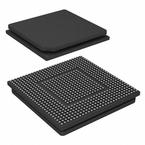Part Datasheet Search > Digital Signal Processors(DSPs) > TI > TMS320C6457CCMH Datasheet PDF
TMS320C6457CCMH Datasheet PDF - TI
| Manufacturer: | TI |
| Category: | Digital Signal Processors(DSPs) |
| Case Package: | 688-BFBGA, FCBGA Exposed Pad |
| Description: | DSP Fixed-Point 32Bit 1GHz 8000MIPS 688Pin FCBGA |
| Documentation: | TMS320C6457CCMH Datasheet (217 Pages)TMS320C6457CCMH User Reference Manual Guide (217 Pages) |
| Pictures: |
TMS320C6457CCMH Datasheet PDF
ADatasheet has not yet included the datasheet for TMS320C6457CCMH
If necessary, please send a supplementary document request to the administrator

TMS320C6457CCMH Specifications
| TYPE | DESCRIPTION |
|---|---|
| Mounting Style | Surface Mount |
| Frequency | 1.00 GHz |
| Case/Package | 688-BFBGA, FCBGA Exposed Pad |
| Clock Speed | 1.00 GHz |
TMS320C6457CCMH Size & Package
| TYPE | DESCRIPTION |
|---|---|
| Product Lifecycle Status | Active |
TMS320C6457CCMH Environmental
TMS320C6457CCMH Function Overview
The TMS320C64x+™ DSPs (including the TMS320C6457 device) are the highest-performance fixed-point DSP generation in the TMS320C6000™ DSP platform. The C6457 device is based on the third-generation high-performance, advanced VelociTI™ very-long-instruction-word (VLIW) architecture developed by Texas Instruments (TI), making these DSPs an excellent choice for applications including video and telecom infrastructure, imaging/medical, and wireless infrastructure (WI). The C64x+ devices are upward code-compatible from previous devices that are part of the C6000™ DSP platform.
●Based on 65-nm process technology and with performance of up to 9600 million instructions per second (MIPS) [or 9600 16-bit MMACs per cycle] at a 1.2-GHz clock rate, the C6457 device offers cost-effective solutions to high-performance DSP programming challenges. The C6457 DSP possesses the operational flexibility of high-speed controllers and the numerical capability of array processors.
●The C64x+ DSP core employs eight functional units, two register files, and two data paths. Like the earlier C6000 devices, two of these eight functional units are multipliers or .M units. Each C64x+ .M unit doubles the multiply throughput versus the C64x core by performing four 16-bit × 16-bit multiply-accumulates (MACs) every clock cycle. Thus, eight 16-bit × 16-bit MACs can be executed every cycle on the C64x+ core. At a 1.2-GHz clock rate, this means 9600 16-bit MMACs can occur every second. Moreover, each multiplier on the C64x+ core can compute one 32-bit × 32-bit MAC or four 8-bit × 8-bit MACs every clock cycle.
●The C6457 device includes Serial RapidIO®. This high-bandwidth peripheral dramatically improves system performance and reduces system cost for applications that include multiple DSPs on a board, such as video and telecom infrastructures and medical/imaging.
●The C6457 DSP integrates a large amount of on-chip memory organized as a two-level memory system. The level-1 (L1) program and data memories on the C6457 device are 32KB each. This memory can be configured as mapped RAM, cache, or some combination of the two. When configured as cache, L1 program (L1P) is a direct mapped cache whereas L1 data (L1D) is a two-way set associative cache. The level 2 (L2) memory is shared between program and data space and is 2048KB in size. L2 memory can also be configured as mapped RAM, cache, or some combination of the two. L2 is configurable up to 1MB of cache. The C64x+ Megamodule also has a 32-bit peripheral configuration (CFG) port, an internal DMA (IDMA) controller, a system component with reset/boot control, interrupt/exception control, a power-down control, and a free-running 32-bit timer for time stamp.
●The peripheral set includes: an inter-integrated circuit bus module (I2C); two multichannel buffered serial ports (McBSPs); an 8-bit Universal Test and Operations PHY Interface for Asynchronous Transfer Mode (ATM) Slave [UTOPIA Slave] port; two 64-bit general-purpose timers (also configurable as four 32-bit timers); a user-configurable 16-bit or 32-bit host-port interface (HPI16/HPI32); a 16-pin general-purpose input/output port (GPIO) with programmable interrupt/event generation modes; an 10/100/1000 Ethernet media access controller (EMAC), which provides an efficient interface between the C6457 DSP core processor and the network; a management data input/output (MDIO) module (also part of the EMAC) that continuously polls all 32 MDIO addresses in order to enumerate all PHY devices in the system; a glueless external memory interface (64-bit EMIFA), which is capable of interfacing to synchronous and asynchronous peripherals; and a 32-bit DDR2 SDRAM interface.
●The C6457 device has three high-performance embedded coprocessors [one enhanced Viterbi Decoder Coprocessor (VCP2) and two enhanced Turbo Decoder Coprocessors (TCP2_A and TCP2_B)] that significantly speed up channel-decoding operations on-chip. The VCP2 operating at CPU clock ÷ 3 can decode more than 694 7.95-Kbps adaptive multi-rate (AMR) [K = 9, R = 1/3] voice channels. The VCP2 supports constraint lengths K = 5, 6, 7, 8, and 9, rates R = 3/4, 1/2, 1/3, 1/4, and 1/5, and flexible polynomials, while generating hard decisions or soft decisions. Each TCP2 operating at CPU clock ÷ 3 can decode up to fifty 384-Kbps or eight 2-Mbps turbo encoded channels (assuming 6 iterations). The TCP2 implements the max
●log-map algorithm and is designed to support all polynomials and rates required by Third-Generation Partnership Projects (3GPP and 3GPP2), with fully programmable frame length and turbo interleaver. Decoding parameters such as the number of iterations and stopping criteria are also programmable. Communications between the VCP2/TCP2s and the CPU are carried out through the EDMA3 controller.
●The C6457 device has a complete set of development tools, which includes: a new C compiler, an assembly optimizer to simplify programming and scheduling, and a Windows® debugger interface for visibility into source code execution.
show more
TMS320C6457CCMH Documents
Part Datasheet PDF Search
Example: STM32F103
72,405,303 Parts Datasheet PDF, Update more than 5,000 PDF files ervery day.

